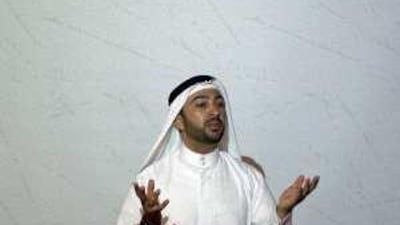SHARJAH // When Mariam Gellert, a Hungarian who has lived in the UAE for 14 years and is training to be a tour guide, accompanied tours of Dubai she could not believe her ears. The guides were simply getting things wrong.
"I've lived here for 14 years and I really respect this country and its people. I find it really sad to see negative things about this country said. If you work as a tour guide, you have to be responsible," she said. "Many of them need to know more about the country. The tour guides need to be more professional." Mrs Gellert was one a number of people recently taking a free tour guide training course offered by the Sharjah Museum of Islamic Civilisation because of this very problem.
So far, more than 170 people have taken the half-day seminar, which also aims to encourage guides, who are mostly based in Dubai, to include Sharjah in their itineraries. The programme covers a brief history of Islam, the religion's culture and art, as well as details of the museum's collection, which includes a section of the kiswah, a black silk cloth embroidered with gold and silver thread that covers the Kaaba in Mecca.
Ulrike al Khamis, the museum's Middle Eastern art collection advisor, said: "There is a real thirst for knowledge among the guides." Officials also suggested Sharjah was also often overlooked as a tourist destination despite the fact it contains some of the country's most impressive historical and cultural sites. The emirate boasts 16 museums, a heritage and arts area and a district dedicated to preserving the centuries-old white gypsum buildings and souks that were once commonplace.
"Guides can be fantastic ambassadors" for the UAE, said Jasem Zaiton, who works at Alpha Tours in Dubai and is one of those teaching the museum's course. If a guide is not well-trained, it can sour a tourist's experience and discourage them from visiting again, he said. "Right now, tour guides are receiving a licence, not a qualification." Part of the problem, he said, is a dearth of Emirati recruits. As a result many of those operating in Dubai are the spouses of local business people, said Mr Zaiton.
"Nowhere else would you have this situation," he said. "Never in Egypt would a non-national be allowed to be a tour guide." Mr Zaiton also noted that many of the tour guides attending the museum's course admitted they had never even been to the emirate before. "Why? Are we out of subjects? We don't know how to entertain the tourists," he said, advising guides to use the emirate's infamous traffic jams as an opportunity to point out sights such as minarets.
Training programmes similar to the one being offered in Sharjah are in place or under development in Dubai and Abu Dhabi, which plans to open several major museums, including branches of the Louvre and Guggenheim, within the next five years. Although tourism authorities are encouraging more Emiratis to enter the industry, it remains an unpopular career choice. The Abu Dhabi Tourism Authority hopes that by 2012 five per cent of its workforce will be Emirati.
In Dubai, Government authorities have said they will impose quotas on private companies if they do not hire more Emiratis. jgerson@thenational.ae

